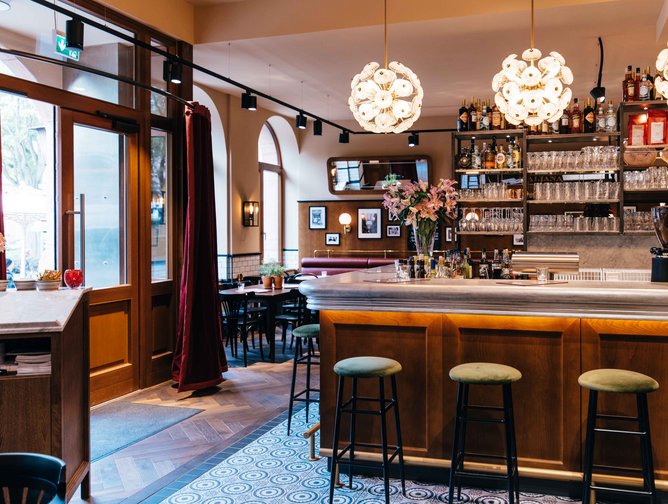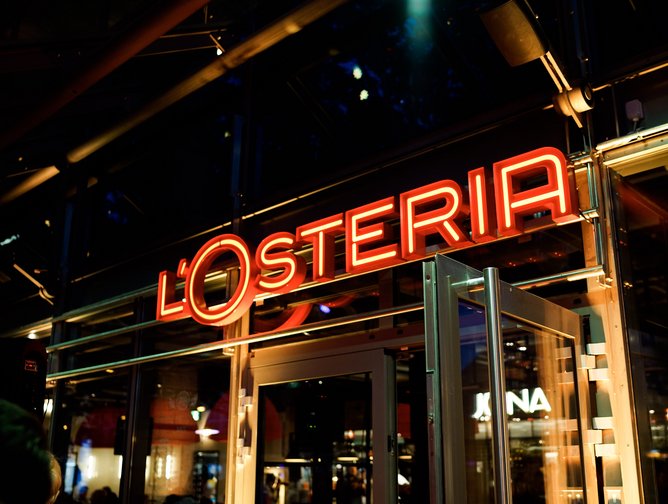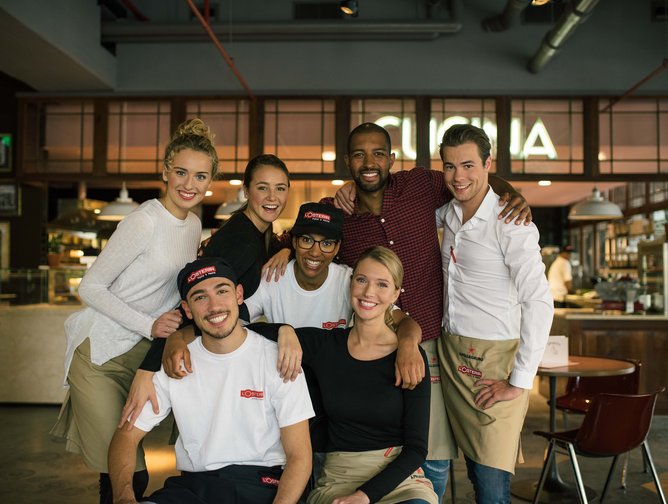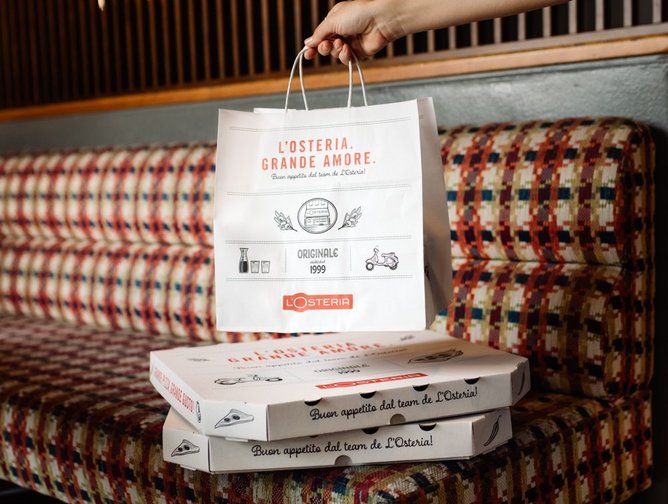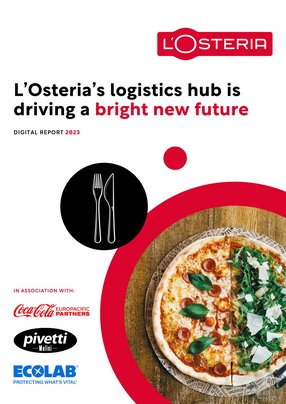L’Osteria logistics hub is driving a bright new future
For the hospitality industry the pandemic was traumatic – the stuff of nightmares. Overnight, restaurants closed, staff were furloughed and customers were but a wistful memory.
For the Germany-based Italian food franchise chain L’Osteria, the date of March 20, 2020, was its darkest ever; it was the day it had to close all its restaurants across Europe.
“It was the hardest day in our history,” confirms Stefan Höllen, L’Osteria’s Supply Chain VP.
But rather than being defined by the trauma of those closures, L’Osteria instead chose to be defined by its response to it.
“It took only two weeks for us to reopen our delivery and pick up channels,” says Höllen. “And within a very short time we had developed a web shop for a home delivery service.
“Covid showed us just how important it was to be flexible, and how crucial it is to have strong partnerships in the supply chain. It is also important to show our nearly 7,000 employees that we are resilient. Resilience is key.”
L’Osteria was so strong that during the entirety of the pandemic it was nearly never out of stock on any products “because our partners supported us”, says Höllen.
He adds: “It showed that we need to have more stability for the future, to be prepared for whatever happens.”
For Höllen being prepared meant that, for the company’s most important products, it must have a two-supplier strategy so that in the event of disruption, it always has a contingency partner.
L’Osteria is a franchise-based restaurant business that’s mainly grown with pizza and pasta. All its restaurants are individually designed.
“It’s not like other brands that are homogeneous,” says Höllen. “All our restaurants have a separate design, which we try to fit to the region where they are, or the city. We want guests to feel at home in a relaxed and nice atmosphere. Our mission at L’Osteria is creating moments where favourite people and favourite food come together.”
Underpinning this mission is Höllen and his team, who make sure each restaurant always has what it needs, when it needs it, at the price at which it needs it.
Echoing his earlier point about resilience, Höllen references the company’s recent pan-European logistical rethink. The company now uses a single logistics provider to supply the restaurants in Germany, and also in all other countries, with more than 1,000 or so food and non-food products its restaurants need.
“The target is to provide a one-stop shopping experience for the restaurants,” explains Höllen, “because they need to concentrate on the guests, and not be sat in the back office ordering products.
“Together with our logistics provider, we provide all restaurants with the same level of service. It doesn’t matter if we have only a single restaurant in Lyon. They will have the same quality level as everyone else.”
Part of the reason for this approach is cost control – an increasingly important factor at a time of stiff cost inflation and the war in Ukraine.
Pre-Covid, says Höllen, the company was performing strongly on cost control.
“One of my proudest achievements since joining L’Osteria at the end of 2017 was we reduced the cost of our food by nearly 4% points of food-cost in just over two years. That was before Covid and the Ukraine war. That was a big achievement.
Inflation continues to be a huge problem”, Höllen concedes.
“The biggest challenge right now in purchasing is the inflation rate. What the future holds, nobody really knows. Everything bad that has happened in the past 18 months could happen again.”
He adds that this is one of the key drivers of its logistics hub structure, the others being efficiency and time savings.
“If you have only a single restaurant in a country and you buy local, it is likely to be much more expensive. It’s better to go with full truckloads over long distances, and then use local partners or our own warehouses from where we can make the last mile deliveries with small trucks. That’s the plan.”
Höllen feels the most difficult part of the operation has already been achieved: switching from wholesalers to a single logistics provider who has “open-book transparency and can bring products everywhere where we are”.
“Now we are working on the optimisation of this structure,” he adds. “Our one-stop strategy is the next step. We are working on systems that will allow us to forecast the restaurants’ inventory needs.
“We have a monthly changing menu, and special products that are not in our standard range, and we already push these products into the restaurants.
“We calculate the needs of each restaurant based on their sales, and then deliver the products they need so that they don’t need to think about it. As I said, we want them to focus on the most important people: their guests.
“The idea is that eventually they will never need to place an order anymore. They simply get what they need and that’s it. That’s the future.”
It’s a future that will serve the company well as it continues to expand.
“We need sound logistics to operate in the new countries we are entering. For example, in September, we will open the first restaurant in Poland, in Warsaw, for which we are setting up a complete supply chain. But there are also more countries under discussion, including those in Scandinavia, as well as Spain and Portugal.”
Since Höllen joined the company in 2017 L’Osteria has doubled the number of its restaurants to 163.
“This is why we need to develop a hub structure,” he says. “We are also looking for new markets for ultra-fresh products, from Spain for example. Plus, many of these products, especially in winter, are moving more to North Africa. We will need reliable and sustainable partners in these places.”
Höllen adds that it is also important that the company continues to develop its operations in smaller countries where it has just a few restaurants.
“We need to optimise our supply chain,” he says. “And we need to be ready for changing supply chain law in Europe, which will be part of all our futures before too long.”
Höllen is referring to the EU’s Supply Chain Act, which from 2024 will require EU companies to audit their suppliers along the entire global supply chain, including all direct and indirect business relationships.
Such challenges are all part of the job – a job that for Höllen has some very definite perks.
“It’s not just our restaurateurs who are passionate about food,” he says. “
Working with food is really interesting. It’s better tasting a tiramisu than handling screws.”
He and his team get plenty of opportunity to give expression to this passion, because they work closely with their product development colleagues.
“It’s very important we are included from the outset with a potential new partner or product,” he says.
“The food in general is inspiring,” he adds. “Since Covid, for example, the development of vegan and vegetarian products has been very fast, which I find interesting.
“It’s a difficult balancing act. At L’Osteria we don’t want to simply follow trends; we want to follow those trends that are a perfect fit for us.”
Hospitality at all levels is a people business, and this is another aspect of his work about which Höllen is passionate.
“I love to work with people. For me, it’s all about the people. It’s very important we have long-term relations with our partners. Even if we put them under pressure with tenders and so on, it’s important to be fair, transparent and reliable also.”
Höllen reveals that the strength of these relationships means that the company does not even have contracts with some partners.
“It’s just a handshake,” he says. “Of course, with some of the larger companies a contract is necessary.”
In total, L'Osteria works with around 120 partners. These include everyone from multinationals such as Coca-Cola to small, local companies.
“The best-known of our partners are Coca-Cola or San Pellegrino. We also work closely with Molini Pivetti, who is one of the biggest wheat mills in Italy. With them we developed our pizza flour and the semolina we use for our pasta production. These have been developed exclusively for L'Osteria, and that is very important to us.”
Another key partner is Ecolab, a global sustainability leader offering, hygiene and infection prevention solutions.
“Ecolab produces all our cleaning materials, so that we can have one standard everywhere. It was also a strategic step to move to Ecolab, taken about two years ago.”
As close as these partnerships are, Höllen says it’s crucial that L'Osteria continues to push their partners to deliver ever-better standards.
“When it comes to tenders we challenge all our partners, even if they are large and have their own processes.
“They always need to be challenged if they are to innovate. It’s important our partners innovate around products, processes, and sustainability.”
